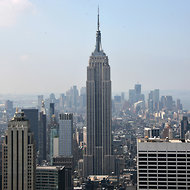 Librado Romero/The New York TimesThe 102-story Empire State Building at Fifth Avenue and 34th Street in Manhattan.
Librado Romero/The New York TimesThe 102-story Empire State Building at Fifth Avenue and 34th Street in Manhattan.
Want to buy a piece of the Empire State Building? You might have the chance.
The Malkin family, which controls the famed 102-story tower at Fifth Avenue and 34th Street, plans to create a publicly traded real estate company that will include the skyscraper, according to papers filed Tuesday with the Securities and Exchange Commission.
Two other buildings controlled by Anthony E. Malkin and his father, Peter L. Malkin — 1 Grand Central, a 55-story, 1.3-million-square-foot building across 42nd Street from Grand Central Terminal, and a 26-story building at 250 West 57th Street — are set to be included in the publicly traded real estate company.
The unusual S.E.C. fillings were devoid of specific financial information, but said that more detailed information is expected to disclosed in about three months, which would then set the stage for an initial public offering. Goldman Sachs is expected to be the lead underwriter on the deal, according to a person with direct knowledge of the potential offering who requested anonymity because he was not authorized to discuss it publicly.
A high-profile I.P.O. of a company built with bricks and mortar would stand in stark contrast to the slew of Internet company stock offerings that have dominated headlines. After several tech I.P.O.s this year, including Groupon‘s and LinkedIn‘s, the market is looking to a initial offering by Facebook sometime in 2012.
The I.P.O. would clean up the complex ownership structure of the Empire State Building and the other Malkin family assets. Each of the buildings that will be placed into the real estate company has separate owners with multiple partners, a legacy of the real estate syndication model pioneered Lawrence A. Wein, Peter Malkin’s father-in-law, and Harry B. Helmsley. As a result, the Malkins have to go through the painstaking process of gaining approval for the deal from the various buildings’ investors and then allocating the shares in the new company.
If consummated, the Malkin’s holdings would then be converted into a real estate investment trust, a common form of public ownership for real estate assets.
After gaining control of both the Empire State Building and the land underneath it about five years ago, the Malkins have spent more than half-a-billion dollars renovating the landmark, restoring its lobby to its original Art Deco grandeur and more than doubling the rents. Its 6,514 windows have been replaced, transforming the 1930s-era office tower into one of New York’s most energy-efficient office buildings.
The name of the new company is not known, but a person briefed on the matter said that it will be named in reference to the Empire State Building, a branding move that the owners hope will attract investors hoping to own a stake in one of the world’s most iconic skyscrapers.
It is unclear at this point what color the building’s tower will be lit up on the evening of its I.P.O., if that day should come. But most people expect it to be green, said a person briefed on the deal.
This post has been revised to reflect the following correction:
Correction: November 29, 2011
An earlier version of the story said the Empire State Building was a century old. It was built in the 1930s.
Article source: http://feeds.nytimes.com/click.phdo?i=ddf880c910b56625c971d834a437408a





